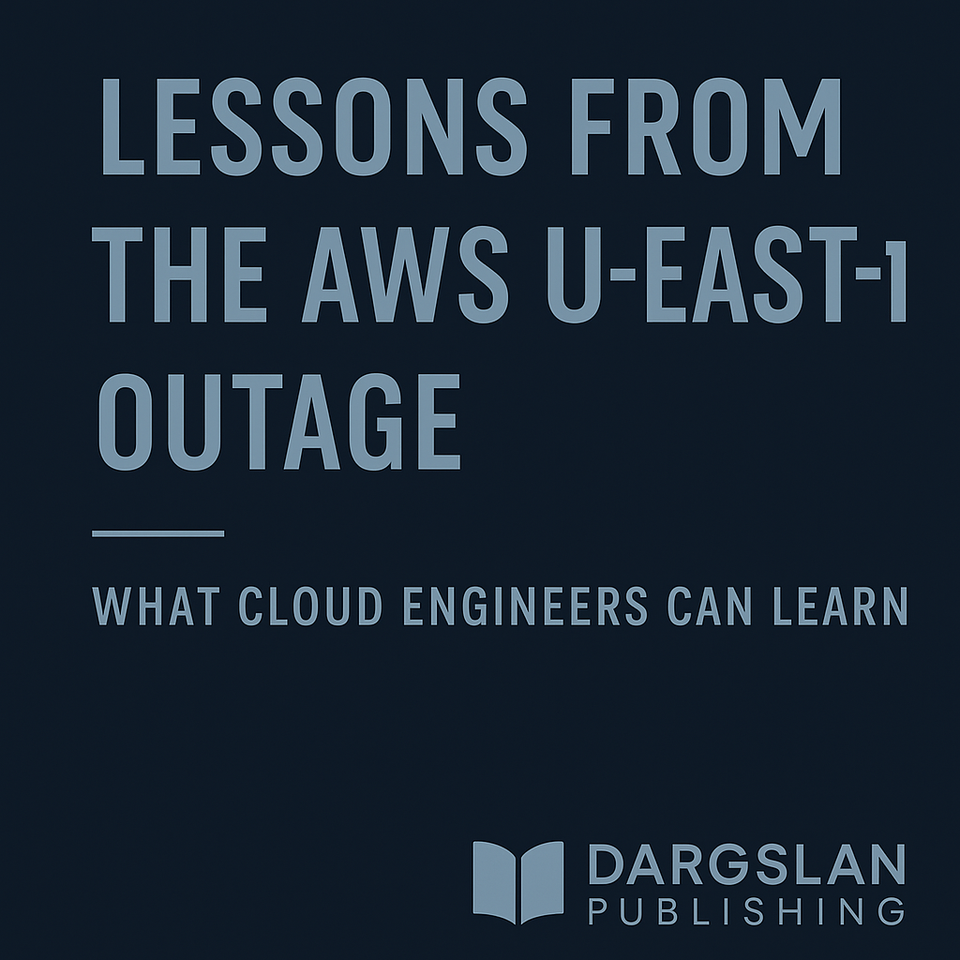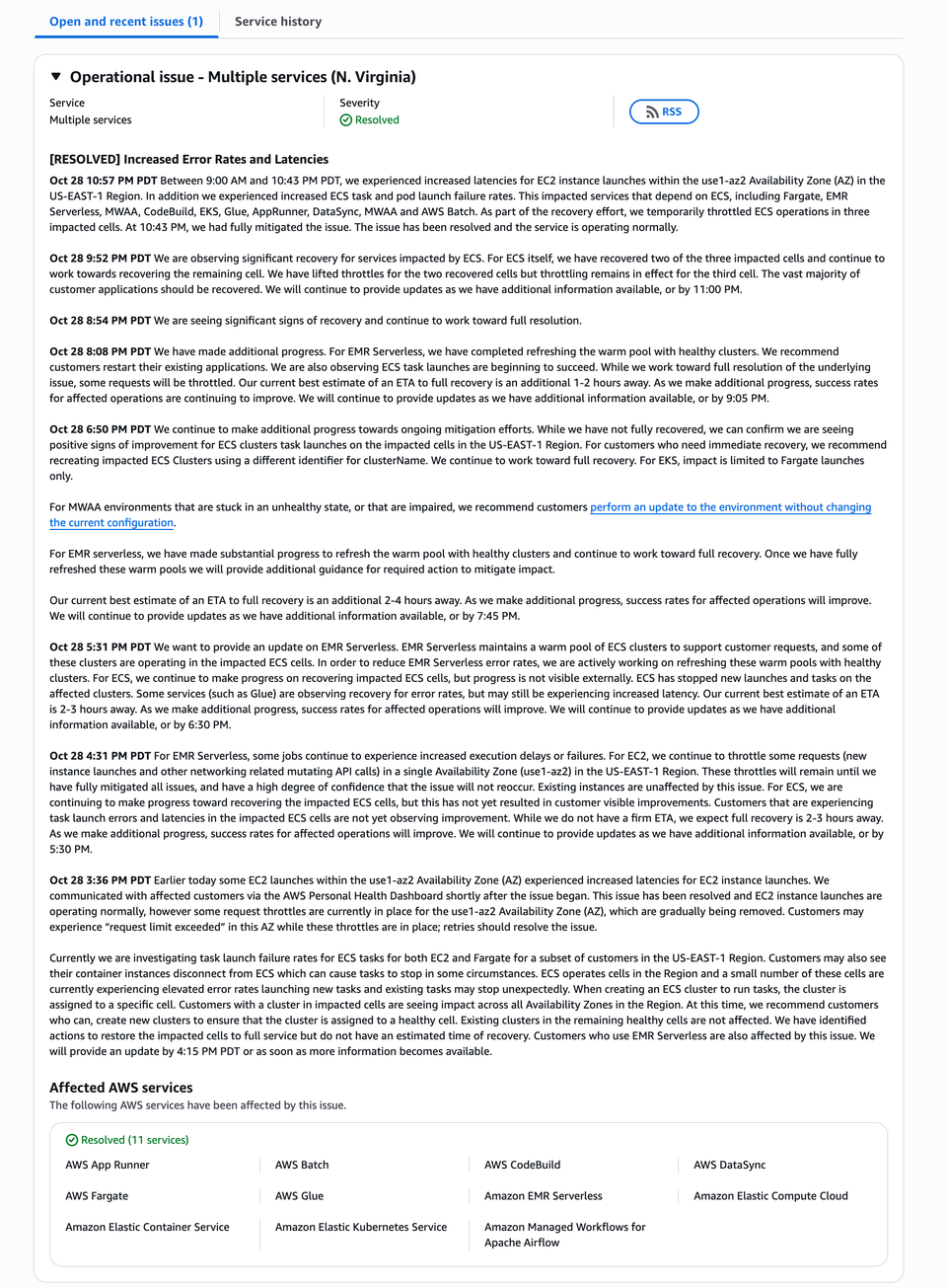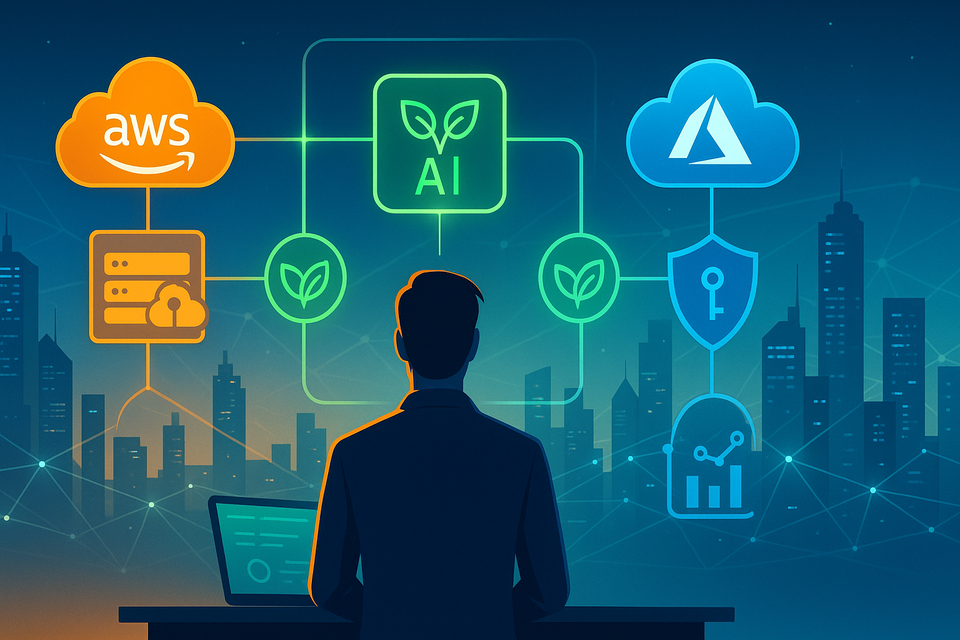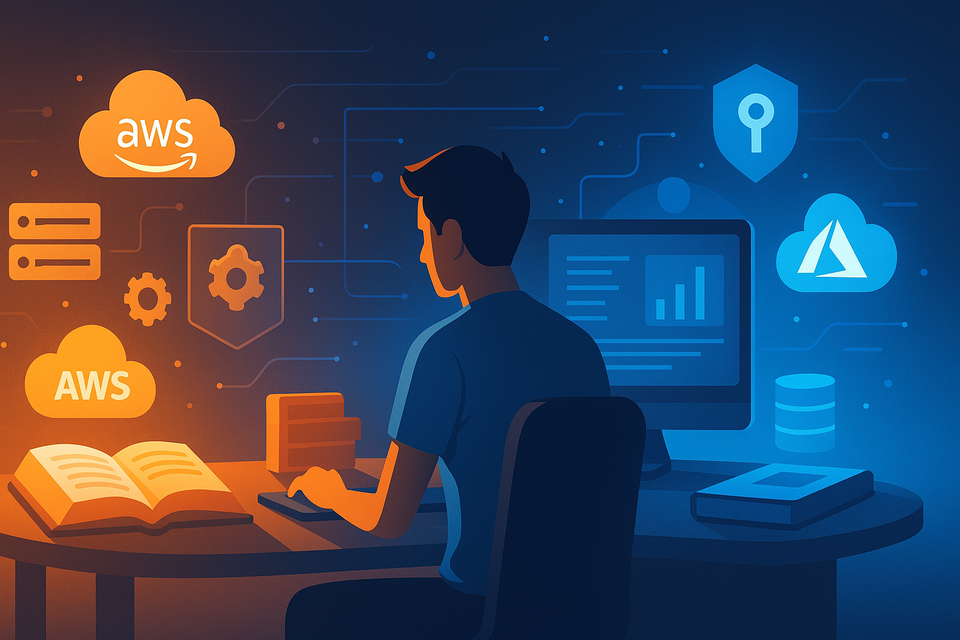AWS vs Microsoft Certifications (Session 3): Exploring Microsoft Certifications in Depth (2025 Edition)
Microsoft certifications continue to evolve — combining cloud, security, AI, and business integration into one unified learning framework.

A complete 2025 guide to understanding Microsoft’s role-based certification system, Azure learning paths, and how to choose the right credential for your cloud career.
Microsoft certifications continue to evolve — combining cloud, security, AI, and business integration into one unified learning framework. In this third session, we take a deep dive into the Azure certification path, explore each level in detail, and help you discover which Microsoft credential fits your professional goals.
1. Why Microsoft Certifications Still Matter in 2025
As of 2025, Microsoft Azure has solidified its position as the second-largest cloud platform in the world — and the fastest-growing one in enterprise adoption.
Thousands of organizations rely on Microsoft for cloud infrastructure, hybrid systems, data analytics, and AI integration.
This means Microsoft-certified professionals are in high demand across industries — not just in tech.
Banks, hospitals, logistics firms, and even governments run workloads on Azure.
Unlike AWS (which focuses primarily on technical architecture), Microsoft’s certification system is role-based — designed to match real job functions.
That makes it more approachable and more aligned with daily work responsibilities.
In 2025, these certifications are more than credentials — they are career blueprints for system administrators, developers, security engineers, and business analysts.
2. Microsoft’s Role-Based Certification Philosophy
Microsoft shifted to role-based certifications to solve one big problem:
Traditional certifications didn’t always reflect what professionals actually do in their jobs.
Instead of abstract skill tests, Microsoft now maps its certifications to real-world roles such as:
- Azure Administrator
- Azure Solutions Architect
- DevOps Engineer
- Security Engineer
- Data Analyst
- Power Platform Developer
Each path is structured around three progressive tiers:
- Fundamentals — Foundational understanding
- Associate — Practical, job-level skills
- Expert or Specialty — Advanced or niche expertise
This model makes it easier for learners to visualize progress, specialize, and grow.
3. The Microsoft Certification Structure (2025 Updated)
| Level | Who It’s For | Key Certifications | Skills Validated |
|---|---|---|---|
| Fundamentals | Beginners and non-technical professionals | Azure Fundamentals (AZ-900), AI Fundamentals (AI-900), Security Fundamentals (SC-900) | Basic cloud, AI, and security concepts |
| Associate | IT professionals with 1+ year of experience | Azure Administrator (AZ-104), Azure Developer (AZ-204), Security Engineer (AZ-500) | Role-specific implementation and management |
| Expert | Experienced architects and engineers | Azure Solutions Architect Expert (AZ-305), DevOps Engineer Expert (AZ-400) | Enterprise-level cloud design, automation, and scalability |
| Specialty | Domain specialists | AI Engineer (AI-102), Data Engineer (DP-203), IoT Developer (AZ-220) | Deep, focused expertise in advanced technologies |
This layered system creates a clear learning ladder for every professional — from beginner to technical leader.
4. Fundamentals Certifications: The Perfect Starting Point
The Fundamentals level is Microsoft’s entry gate for anyone new to cloud technology.
🌩️ Microsoft Certified: Azure Fundamentals (AZ-900)
Purpose:
Introduce essential cloud concepts, services, and deployment models in Azure.
Focus Areas:
- What the cloud is and how Azure delivers it
- Core Azure services (Compute, Networking, Storage, Databases)
- Pricing and SLA management
- Security and compliance basics
Ideal For:
Beginners, non-technical managers, students, and business decision-makers.
Cost: ~$99 USD
Exam Length: 60 minutes
💡 Tip: Even experienced professionals use this as a refresher before tackling advanced certifications.
🤖 AI Fundamentals (AI-900)
Purpose:
Introduce AI and Machine Learning fundamentals using Azure AI tools.
Skills:
- AI workloads and considerations
- Azure Cognitive Services
- Responsible AI principles
Ideal For: Business and data professionals exploring AI solutions.
🔐 Security, Compliance, and Identity Fundamentals (SC-900)
Purpose:
Cover security principles across Microsoft cloud and hybrid environments.
Skills:
- Identity and access management
- Threat protection and governance
- Compliance frameworks
Ideal For: Entry-level cybersecurity and compliance learners.
5. Associate Level: Building Real Job Skills
The Associate level is where technical professionals gain job-ready expertise.
Here are the most popular certifications for 2025:
1. Azure Administrator Associate (AZ-104)
Purpose:
Manage and monitor Azure resources and subscriptions.
Skills Tested:
- Deploying virtual machines and networks
- Managing identities with Azure AD
- Configuring storage and monitoring
Ideal For: System administrators, IT operations, and infrastructure engineers.
Preparation Time: 6–8 weeks.
Why It’s Important:
This certification proves you can manage real cloud environments efficiently — a crucial skill for most enterprise roles.
2. Azure Developer Associate (AZ-204)
Purpose:
Validate your ability to develop, test, and maintain Azure-based applications.
Skills:
- Using Azure SDKs and REST APIs
- Building serverless apps with Azure Functions
- Integrating APIs, queues, and messaging systems
- Implementing security and monitoring
Ideal For: Software developers, DevOps engineers, backend specialists.
Cost: ~$165 USD.
Validity: 1 year (renewable online for free).
3. Azure Security Engineer Associate (AZ-500)
Purpose:
Demonstrate your ability to manage identity, access, and data protection in Azure.
Skills:
- Securing cloud workloads
- Implementing threat protection
- Managing hybrid identity with Azure AD
- Using Defender for Cloud and Sentinel
Ideal For: Security engineers and administrators in cloud-heavy environments.
6. Expert Level: Strategic Leadership and Design Skills
Expert certifications represent the highest level of Azure mastery.
They’re often required for senior engineers, architects, and technical leads.
🏗️ Azure Solutions Architect Expert (AZ-305)
Purpose:
Validate expertise in designing and implementing end-to-end Azure solutions.
Skills:
- Hybrid architecture design
- Governance and identity solutions
- Data storage, networking, and compute integration
- Security and scalability trade-offs
Ideal For: Cloud architects and senior consultants.
Exam Difficulty: 9/10 — requires broad technical and strategic understanding.
💡 Tip: This certification often pairs with AWS Solutions Architect – Professional for a multi-cloud edge.
🔄 DevOps Engineer Expert (AZ-400)
Purpose:
Demonstrate skills in automating software delivery and integrating DevOps pipelines.
Skills:
- CI/CD pipeline design
- Infrastructure as Code (IaC)
- GitHub Actions, Azure DevOps Services
- Monitoring and continuous feedback
Ideal For: DevOps engineers, automation specialists, cloud developers.
Difficulty: 8/10.
Preparation: 8–10 weeks.
7. Specialty Certifications: Deep Technical Mastery
Microsoft Specialty certifications are designed for niche technical roles — perfect for professionals who want to differentiate themselves in a crowded market.
| Specialty | Focus Area | Ideal For |
|---|---|---|
| AI Engineer (AI-102) | Designing and deploying AI solutions on Azure | AI developers, ML engineers |
| Data Engineer (DP-203) | Building and optimizing data pipelines | Data architects, BI developers |
| IoT Developer (AZ-220) | Implementing IoT solutions | Embedded and automation engineers |
| Security Operations Analyst (SC-200) | Threat detection and response | SOC analysts, cybersecurity specialists |
| Identity and Access Administrator (SC-300) | Managing hybrid identity infrastructure | IAM engineers, system admins |
| Information Protection Administrator (SC-400) | Compliance, data classification, and DLP | Compliance officers, InfoSec pros |
Specialty exams showcase deep knowledge — ideal for senior professionals who already hold Associate or Expert credentials.
8. Exam Structure and Renewal Policy
| Level | Duration | Question Type | Renewal |
|---|---|---|---|
| Fundamentals | 60 mins | Multiple choice | 1 year |
| Associate | 120 mins | Multiple choice, case studies | 1 year |
| Expert / Specialty | 150 mins | Scenario-based, practical questions | 1 year |
Unlike AWS, Microsoft certifications renew annually, but the renewal process is free and online.
You take a short, open-book assessment on Microsoft Learn — keeping your credential active and up to date.
9. Study and Preparation Tips for Azure Exams
- Use Microsoft Learn — It’s official, free, and constantly updated.
Each certification has structured learning paths with labs and sandboxes. - Hands-On Practice — Use the Azure Sandbox or Free Trial Account to deploy real services.
- Join Study Groups — Microsoft Tech Community and Reddit groups are active with learners sharing insights.
- Master Core Services:
- Compute: Virtual Machines, Functions, App Service
- Storage: Blob, Files, Queues
- Networking: VNets, NSGs, Load Balancers
- Identity: Azure AD, Role-Based Access Control
- Set a Schedule — 1 hour daily study for 8–10 weeks is ideal.
- Don’t Skip Security Topics — Every Microsoft exam includes questions on compliance and identity.
10. Career and Salary Impact (2025 Outlook)
| Role | Top Certification | Average Salary (USD/year) |
|---|---|---|
| Azure Administrator | AZ-104 | $110,000 |
| Azure Developer | AZ-204 | $115,000 |
| Solutions Architect | AZ-305 | $135,000 |
| DevOps Engineer | AZ-400 | $130,000 |
| Security Engineer | AZ-500 | $125,000 |
| Data Engineer | DP-203 | $120,000 |
Microsoft-certified professionals enjoy a 15–20% salary advantage and a faster promotion rate due to recognized expertise in secure, enterprise-grade systems.
11. AWS vs Microsoft — The Key Differences
| Feature | AWS Certifications | Microsoft Certifications |
|---|---|---|
| Orientation | Platform-specific | Role-specific |
| Renewal | Every 3 years (paid) | Every 1 year (free) |
| Difficulty | More architecture-focused | More practical and guided |
| Ecosystem | Developer-centric | Enterprise and hybrid-centric |
| Entry Level | Cloud Practitioner | Azure Fundamentals |
| Best For | Engineers and DevOps | Administrators and IT managers |
Both are excellent — the “better” one depends entirely on your career environment.
If your company uses Microsoft 365, Teams, and Dynamics, Azure certifications are the natural choice.
If your organization is cloud-native or multi-platform, consider AWS first — or both for ultimate flexibility.
12. The Future of Microsoft Certifications (2025–2027)
Microsoft is evolving its certification ecosystem rapidly.
Expect new tracks in:
- AI and Copilot Integration
- Cloud Security and Compliance Automation
- Green Cloud Infrastructure
- Generative AI Operations (GAIOps)
Certifications are becoming modular — allowing professionals to mix and match smaller micro-certifications for targeted learning.
By 2027, Microsoft certifications will represent a continuous learning loop, not a one-time exam.
13. Common Mistakes to Avoid
- ❌ Studying without hands-on Azure experience
- ❌ Ignoring role prerequisites (e.g., starting with AZ-305 before AZ-104)
- ❌ Overlooking the renewal process
- ❌ Focusing only on theory, not practical labs
- ❌ Neglecting identity and governance — Azure exams emphasize both
14. Conclusion
Microsoft’s certification ecosystem is a powerful framework for career growth.
It helps professionals prove competence, stay current, and connect cloud skills with business value.
Whether you start with Azure Fundamentals or aim for Azure Solutions Architect Expert, each credential builds real-world ability that employers value.
In 2025, cloud literacy equals career security — and Microsoft certifications are one of the best investments you can make.
Next in the Series
Session 4 – AWS vs Microsoft: Head-to-Head Comparison (2025 Edition)
We’ll analyze both ecosystems side by side — covering salary data, exam complexity, renewal rules, and which path best fits your long-term goals.
#Microsoft #Azure #Certification #CloudComputing #CareerGrowth #DevOps #CloudEngineer #TechEducation #ITCareers #Cloud
Sponsored by Dargslan.com — Master Azure the Smart Way
At Dargslan Publishing, we make learning Azure simple and effective.
From Fundamentals to Expert-level certifications, our guides blend real-world labs with structured study plans.
💼 Included in every e-book:
- Step-by-step exam objectives
- Hands-on labs using Azure Sandbox
- Real interview questions and practical tasks
- Continuous updates for 2025 exam changes
Start mastering Microsoft Cloud today at 👉 dargslan.com
🎁 Bonus Section
Top Free Tools to Prepare for Microsoft Certifications (2025)
| Tool | Type | Description |
|---|---|---|
| Microsoft Learn | Official Platform | Free learning paths for every Azure certification. |
| Exam Sandbox | Practice | Simulated environment for testing real Azure features. |
| GitHub Labs | Hands-On Labs | Practice CI/CD, DevOps, and code integration. |
| Tech Community | Forum | Connect with professionals and study groups. |
| LinkedIn Learning | Courses | In-depth role-based Azure learning modules. |
💡 Pro Tip: Combine Microsoft Learn with GitHub Labs for maximum hands-on experience — it’s the fastest route to passing any Azure exam.




